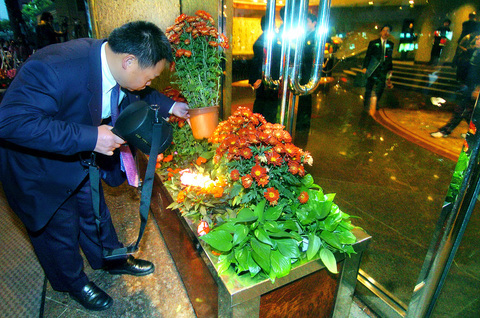Former US president Bill Clinton will maintain his support for the "one China" policy despite his upcoming meeting President Chen Shui-bian (
"The United States and I have not changed our positions [on the Taiwan question] ... I hope that China and Taiwan would not think that my position or the US's would change because of this trip," he told a Hong Kong newspaper group in an interview in Tokyo ahead of his two-day visit to Taiwan yesterday.

PHOTO: CHEN TSE-MING, TAIPEI TIMES
"I sincerely stand by the one-China policy ... I sincerely hope to see peace in the Taiwan Strait. At the same time I urge them both to solve their disputes peacefully," he was quoted as saying.
Clinton promised to also abide by the three joint communiques which form the basis of China-US relations and to oppose Taiwan independence.
Such views would be passed on to Chen during his visit on the country during which he would also laud the economic achievements there.
He said he believed the closer economic ties between them would help to ease cross-strait tensions.
Irritable China
Nevertheless, China was irritated by Clinton's scheduled meeting with Chen, who was viewed as a dangerous "splittist" leading Taiwan down the road toward formal independence, a move Beijing said would be regarded as an act of war.
But last week, Chen pledged not to push for the nation's formal independence after a series of peace overtures to rival China.
Clinton welcomed the softening tone in Chen's recent remarks and believed the Taiwan issue could be solved without force.
Clinton is scheduled to deliver a speech on Asia's democracy in Taipei on Sunday evening. His visit to Taiwan will be his first he left the White House in January 2001.
Clinton ordered two aircraft carrier battle groups to waters near Taiwan after China lobbed ballistic missiles into shipping lanes near Taiwan's main island in 1996.

Alain Robert, known as the "French Spider-Man," praised Alex Honnold as exceptionally well-prepared after the US climber completed a free solo ascent of Taipei 101 yesterday. Robert said Honnold's ascent of the 508m-tall skyscraper in just more than one-and-a-half hours without using safety ropes or equipment was a remarkable achievement. "This is my life," he said in an interview conducted in French, adding that he liked the feeling of being "on the edge of danger." The 63-year-old Frenchman climbed Taipei 101 using ropes in December 2004, taking about four hours to reach the top. On a one-to-10 scale of difficulty, Robert said Taipei 101

Nipah virus infection is to be officially listed as a category 5 notifiable infectious disease in Taiwan in March, while clinical treatment guidelines are being formulated, the Centers for Disease Control (CDC) said yesterday. With Nipah infections being reported in other countries and considering its relatively high fatality rate, the centers on Jan. 16 announced that it would be listed as a notifiable infectious disease to bolster the nation’s systematic early warning system and increase public awareness, the CDC said. Bangladesh reported four fatal cases last year in separate districts, with three linked to raw date palm sap consumption, CDC Epidemic Intelligence

Taiwanese and US defense groups are collaborating to introduce deployable, semi-autonomous manufacturing systems for drones and components in a boost to the nation’s supply chain resilience. Taiwan’s G-Tech Optroelectronics Corp subsidiary GTOC and the US’ Aerkomm Inc on Friday announced an agreement with fellow US-based Firestorm Lab to adopt the latter’s xCell, a technology featuring 3D printers fitted in 6.1m container units. The systems enable aerial platforms and parts to be produced in high volumes from dispersed nodes capable of rapid redeployment, to minimize the risk of enemy strikes and to meet field requirements, they said. Firestorm chief technology officer Ian Muceus said

MORE FALL: An investigation into one of Xi’s key cronies, part of a broader ‘anti-corruption’ drive, indicates that he might have a deep distrust in the military, an expert said China’s latest military purge underscores systemic risks in its shift from collective leadership to sole rule under Chinese President Xi Jinping (習近平), and could disrupt its chain of command and military capabilities, a national security official said yesterday. If decisionmaking within the Chinese Communist Party has become “irrational” under one-man rule, the Taiwan Strait and the regional situation must be approached with extreme caution, given unforeseen risks, they added. The anonymous official made the remarks as China’s Central Military Commission Vice Chairman Zhang Youxia (張又俠) and Joint Staff Department Chief of Staff Liu Zhenli (劉振立) were reportedly being investigated for suspected “serious